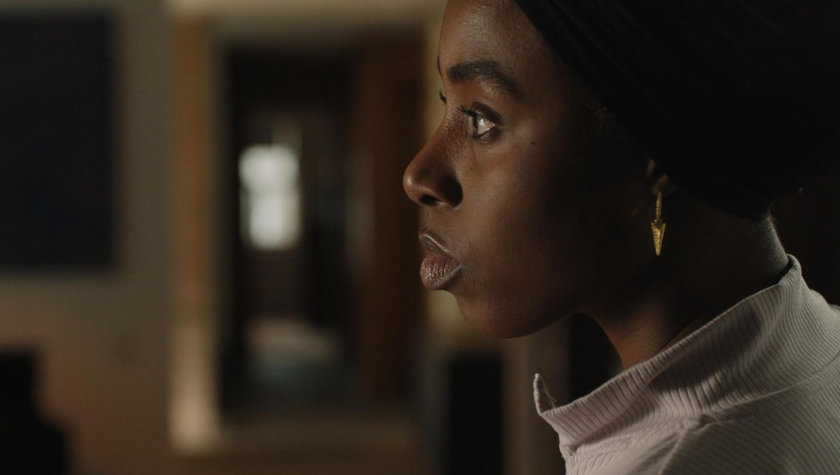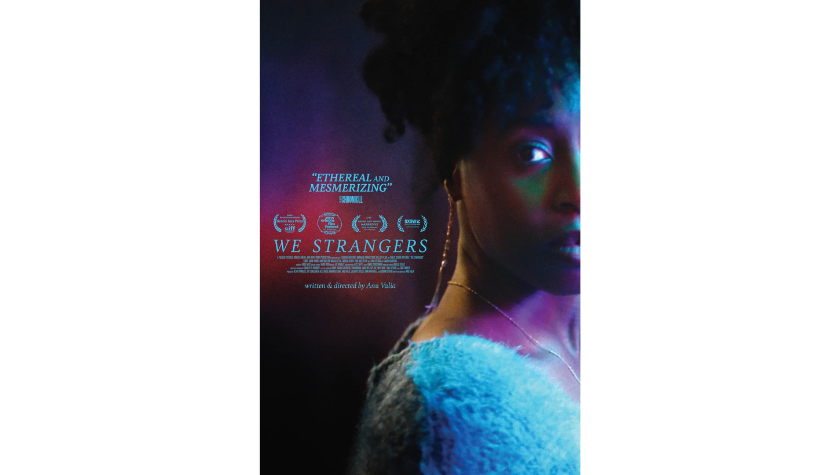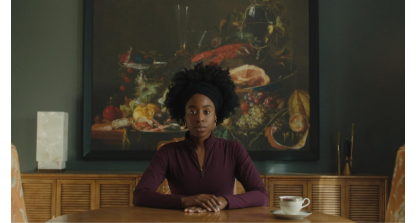We Strangers is a surprising and deeply personal study of race and class in small-town America. The story centers on Ray (Kirby Howell-Baptiste), a charming young woman living in Gary, Indiana who’s trying to make ends meet in the gig economy. While she’s determined to pay her bills, she discovers her integrity, self-worth and identity will be tested in unexpected ways.
Writer-director Anu Valia, a first-generation Indian American, grew up in the Midwest and says she understands the challenges of fitting in when you feel different from those around you. From an early age, she had to learn how to adapt to unfamiliar situations, but that skill also gave her resilience. “I feel like I became very good at tailoring who I was to the surroundings around me. It can be a great gift, a superpower even, but I started asking myself, ‘Where does that leave you? Who are you when you’re always being somebody else?’”


These are questions Anu shares with her protagonist, Ray, who searches for her own agency as she cleans houses for wealthy people. Constantly feeling at the mercy of her employers’ whims, Ray seizes a small morsel of influence by telling a little lie one day while she’s cleaning Jean’s (Maria Dizzia) bedroom. While Ray cleans up after Jean, Jean lounges in front of the TV, seemingly mesmerized by a TV psychic. Ray casually mentions that she, too, can commune with spirits; as in, talk to the dead the way the TV psychic does. And, for an extra hundred bucks, Ray can give messages to Jean’s deceased sister. Intrigued, Jean happily forks over the cash. This lie flips the power dynamic between Ray and the people for whom she cleans in unexpected ways.
Anu explains Ray’s intentions with the lie. “I think she’s just moving with her instinct, because in the moment, she’s feeling uncomfortable and wants to change that,” says Anu, who saw a fun challenge to structure a film about a woman slipping and making a ridiculous statement off-the-cuff. Ray lying about having psychic ability is the film’s inciting incident.
“Structurally, I haven’t really seen movies hitch their wagon to someone just doing something very impulsively. That was interesting to me as a starting point,” she says.
The other characters in the story easily believe Ray is psychic because she has such a strong ability to read people, so she keeps building on her new persona – until it snowballs out of control.
For Anu, Ray’s lie becomes an exciting way to explore assimilation, class, race, and identity without turning the story into a bland philosophical debate. “I’m not really interested in ‘issues movies.’ What I’m interested in is the way the social breakdowns of America work, and my entry point is always through one person.”
The seed for the We Strangers began in 2014. Like many indie features, getting it made required persistence, research, and, as Anu says, “Cobbling together that cash, baby, whoever will give it to you!” Some financing eventually came from partners like Pegasus Pictures and Flourish Ventures, whose mission to explore financial inequity in America aligned with the film’s themes.
In the film, there’s a metaphor using the tale of a prisoner on a tropical island. The prisoner is held captive in an underground cell until the island’s volcano erupts and everyone on the island dies – except for the prisoner, who is now free. Alone, but free.


“Is that an incredible blessing, or was that a curse?” asks Anu, adding, “I wanted to present a story in this movie, where depending on where you are in life, depending on where you come from, how you grew up, what your outlook is, you see that differently. Ray interprets it as, ‘Wow, this person is freed, but then without community, they are still in a prison of solitude.’ She sees it that way because she’s grown up with a strong community, where if she were alone, she would feel like she’s in a prison.”
Anu believes using metaphors makes for powerful storytelling because a metaphor can pull disparate story elements together. “It’s not just the words on the page, it’s not just the acting, it’s not just the way we shoot it, it’s the colors and the sound and the music. All of these things create this sort of ephemeral feeling that only cinema can really capture.”
When she’s not making indie films, Anu has been steadily building a successful directing career in television. She’s directed episodes of prestige series including And Just Like That, Adults, Shrinking, Based on a True Story, Man on the Inside, and Interior Chinatown, and that’s just in the past year.
Her advice for screenwriters trying to make films that may not scream “commercial” is to treat the project like a long-term relationship. “You have to keep falling in love with your idea,” she says. “There are times you’ll fall out of love with it, but you find your way back in. If you think the story is worth telling, you’ll keep talking about it, and eventually the right people will find it.”
Anu admits the journey can take years (in her case, a decade), but believes persistence pays off. “It is a very long journey, and the expectation to always love it is crazy. When I’ve fallen back in love with a project, I’ve discovered new things and made it stronger.”
We Strangers, starring Kirby Howell-Baptiste, Tina Lifford, and Sarah Goldberg, premiered at the 2024 SXSW Film Festival to rave reviews, and opens theatrically on August 22nd in New York and Los Angeles, before going wide Sept. 9.

